#foundation meta
Explore tagged Tumblr posts
Text
from david s. goyer's r/television foundation AMA: his personal headcanon on what happened after the events of 1.10

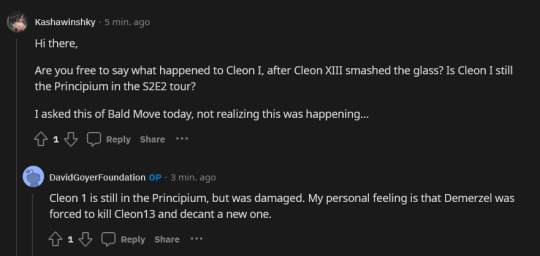
christ!!!
#our post-s1 fix-it fics now seem incredibly naive 😭#foundation#foundation apple tv#demerzel#cleon xiii#brother day#txt#foundation meta
106 notes
·
View notes
Text
Can't believe the Foundation s2 finale had 50 twists and fake-outs but not the specific one I was hoping for!!!!!!
Like I honestly thought for sure that the first Cleon's backstory for Demerzel would turn out to be hugely false and biased from his pov, and we'd find out that she actually planted the idea of the genetic dynasty in his head from a young age and let him think it was all him.... And then she also let him believe he was modifying her programming to protect himself, but she'd totally have something up her sleeve there too, like some kind of built-in protection against certain programming mods or whatever? (The episode is literally called CREATION MYTHS??????)
To be fair, I'm not familiar with the source material, but gosh it felt like a missed opportunity to just be like "yes indeed, the 18K-year-old robot is technically an unwilling participant in all this, how unfortunate for her" when they could have twisted it to make Demerzel the orchestrator who played Cleon 1 like a damn fiddle so that she could rule the galaxy from the shadows!!!! Because of course she came up with a perfect plan when she had five thousand years to do nothing but think!!!!! Hello????
I did like the finale and really want to get a third season but WOW.....I'm mourning the arc that could have been.
#foundation#foundation apple tv#foundation spoilers#foundation meta#demerzel as the mastermind behind everything about cleon would have made me black out from sheer joy on the spot tbh#SIGH
10 notes
·
View notes
Text
Okay but seriously, Erro's story is making me lose my fucking mind. The god of justice becoming mortal amidst an era of injustice, of not just twisted justice but a lack of it, where there is no rhyme or reason to who lives and dies, not only because of the war but also because there is nothing and no one left to enforce justice in the wake of war. There are no institutions (in the broad sense) to base any idea of justice upon, and when left to individuals to enforce in an era where survival alone is paramount, it of course falls to the wayside. There's a reason why the Platinum Dragon is a lawful deity, after all. Even a unit as small as the immediate family takes herculean efforts to maintain; the families we see in Divergence, both made and found, are scattered, torn apart, before and during this time frame. The series begins with a desperate attempt to save a family, with Fiedra orchestrating Crokas's rescue (and Erro's along with him), and even that effort could've failed had Crokas not made it out of the walls.
Of course Erro, raised to believe in the ideals of justice, loses faith. While the war rages on, there can be no justice. The scale of destruction barely leaves room for nature, let alone civilization.
Of course only in the war's wake, when the rebuilding begins, can justice become again a consideration, and it is is not innate. People must choose it, choose to prioritize it in the process of rebuilding, and not everyone does! But those who do choose it are those who Erro follows—and leads, as nothing more than a civilian, as he steps first into the fray to defend what small justice there is. All of Torm's Hill, who do step into battle in his wake. Nia, who holds faith even in loss by the bloody tips of her fingers. Crokas, who has believed he is only a monster even when he is little more than a scared child, using that belief as a weapon in defense of other scared children. Fiedra, whose ruthlessness is turned against the continued stirrings of injustice when her instinct would have urged her to join them. Garen, who remains until the end nothing more than a stone-carver, choosing to build even after recognizing when it is necessary to destroy.
Erro did not lose faith in the ideals of the Platinum Dragon—he lost faith that those ideals could survive the era in which he was born, an era that, in another form, he had helped shape. And in this form—a lonely wanderer, no better than any other traveler along the road—he saw those ideals rekindled, by the people who choose to pick up the torch. Only in knowing that that torch would be carried after he, Erro, was gone, was the Platinum Dragon able to keep faith that the world that he was leaving behind could become a better one in his wake.
#cr spoilers#exu divergence#critical role#cr meta#erro mordaurum#anyway also not really the point of this post but writing this did really make me consider the place of deontology in the world lmao#like I do as a person prefer the teleological approach but like#you need both! you need the foundation upon which to build and the clarity to recognize when the foundation is rotten
372 notes
·
View notes
Text
I’m currently stuck on these two panels
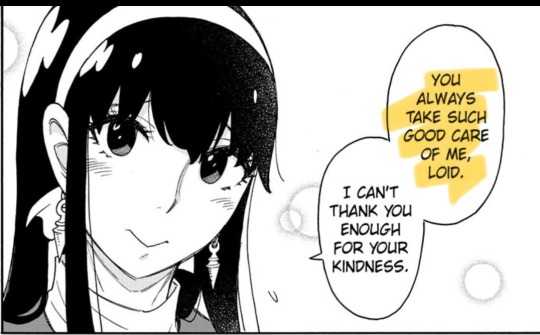
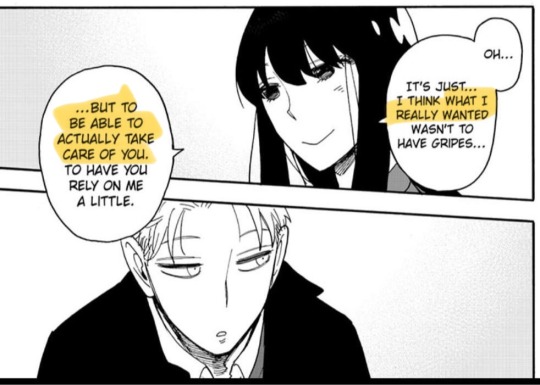
From mission 68 and 86, respectively.
I don’t really have my thoughts together on this, but something about trust, and vulnerability, and that being taken care of also leads to a yearning to caretake in turn —
That there is something particular about the dynamic, in adulthood, especially with these two who are self-sufficient and also haven’t experienced this before. That choice to turn oneself over, to choose trust and to choose vulnerability, and to choose to be worthy of the other’s trust and vulnerability — even taking (or maybe even because of) the incumbent complications of their situation.
#twiyor#sxf manga spoilers#spy x family#spy x family manga spoilers#chewing the walls i’m chewing them#here fandom take this!#meta lite#they hold one another gently 🤲#endo’s dedication to foundational humanity is so beautiful#like there is something so human in being cared for or trusted or loved#and longing so much to care for or trust or love in return#and it’s reverse: caring or trusting or loving#and longing to be cared for or trusted or loved in return#or all three as the case may be 😊#it’s about ~relationality#i love them your honour
313 notes
·
View notes
Text
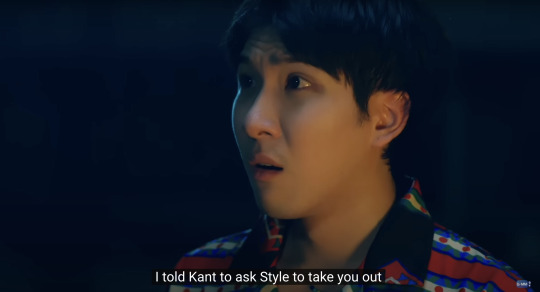
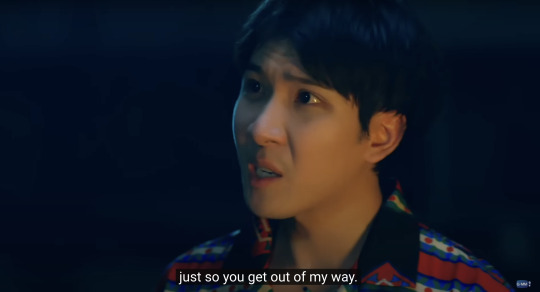
oh man bison's guilt when he has to confess his part in the whole scheme to fadel was palpable.
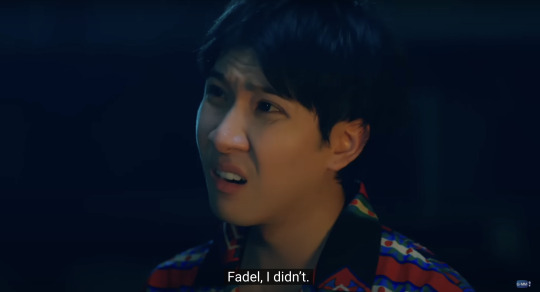

because bison had his reasons, he was backed into a corner, nearly suffocating under his mother's rules and fadel's rigidity, and desperate for any semblance of a life he could call his own.

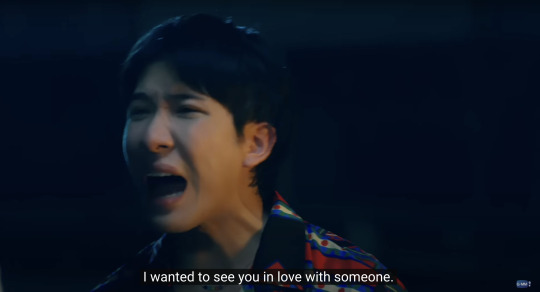
and he meant well! part of it was that he genuinely was doing it for love of his brother!! and he didn't mean for it to get so out of hand.
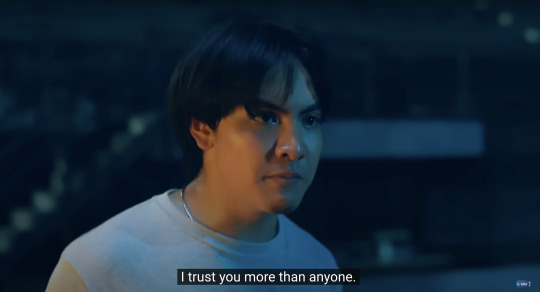

but its too late now to say he's sorry. its too late now to try to fix this. because his precious person already got hurt.
but wait...
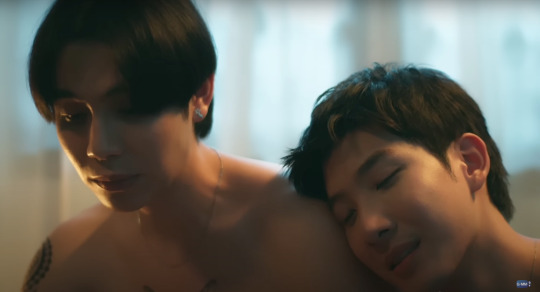
doesn't this...

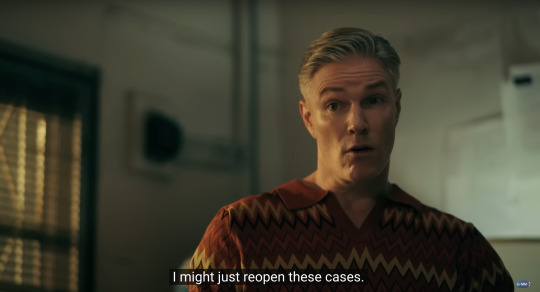
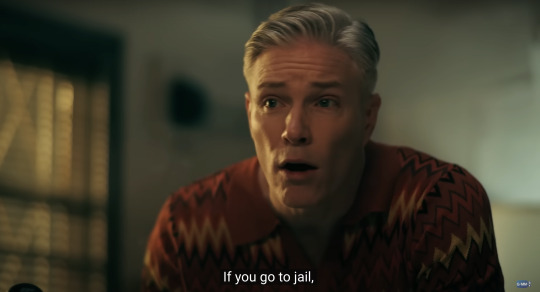

...kind of sound...
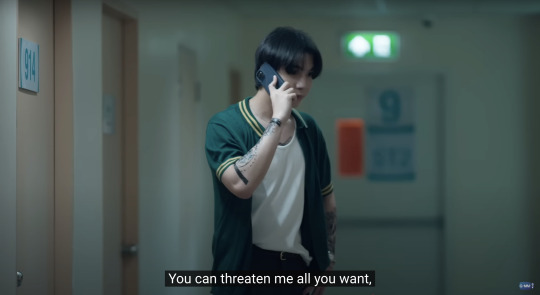
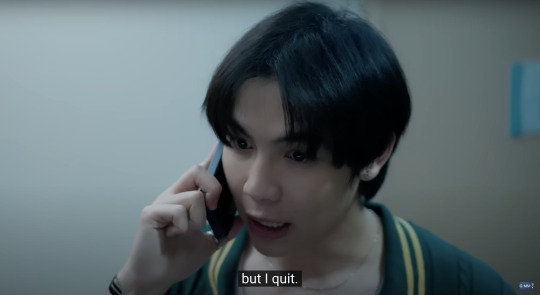
...oddly familiar?

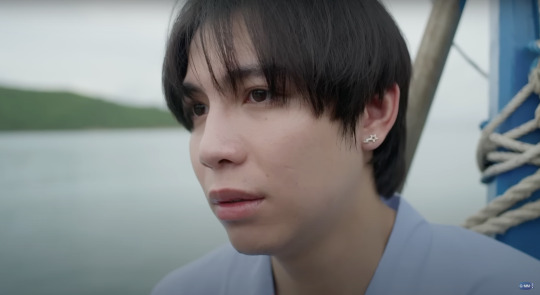
(and this is why you can see the threads of forgiveness already shimmering in the distance.)
#the heart killers#thk ep 7#bison#kant pattanawat#kantbison#kantbison meta#thk parallels#thk meta#ohhh they're so deliciously right for each other#damn when i said i knew they were going to get so much more intentional with the kb threads in the 2nd half#like damn damn damn did ep 7 DELIVER!!!#hui talks thk#// the reason why this is significant is because right here we're seeing the foundations being laid#for bison to have an EMOTIONAL basis for his eventual forgiveness for kant#“love” isn't enough because if love was enough bison would already be forgiving kant (like fadel is to style)#but bison needs to feel what its like on the other side of this equation and he did right here
162 notes
·
View notes
Text
it's about...longevity? stability? it's about natsume believing he'll be somewhere long enough to plant flowers and see them bloom. it's about him taking touko seriously when she asks him to tell her what flowers he wants to plant. it's about making something with his own hands, building a future with the fujiwaras. it's about him repairing a rundown home for someone else, restoring it because it's beloved to them, because it's the home of someone they love. it's about him seeing touko's joy and thinking about the youkai saying we'd like to look upon her happy face forever. it's about the box garden making him think of the fujiwaras' garden and his parents' garden, about the flowers being both the memory of flowers that bloomed there before, and the flowers that he and the youkai planted earlier that day. it's about him waking up in both worlds with sensei. it's about touko finding the petal in his hair. it's about him feeling how he falls short and the youkai saying, but you have such gentle hands...
#watch this right after the ephemeral ones to die instantly. i assume. i haven't tried it#i feel like so many of the emotional beats that destroy me in this story come down to impermanence#accepting loss and change. finding the beauty in transience. treating every encounter as something precious‚ knowing it's ephemeral#and this chapter is about...also accepting renewal? allowing oneself to think about the possibility of love lasting#allowing oneself to put down roots. nurturing what is there. building foundations. doing it for and with people#god you know what else you shouldn't watch this after if you don't want to keel over dead probably. the childhood home arc#natsume can now think of the memory of sitting with his father looking at his mother's garden#and associate it with warmth instead of pain. because he's no longer afraid of losing it. because of the trust he has built#because he knows he can build something. the people here have made it safe for him and he has and he is and he will#i am crying so hard i should be collecting my tears for water reclamation purposes#natsume's book of friends#natsume yuujinchou#natsuyuu meta#my posts#f
290 notes
·
View notes
Note
The himbo, malewife, goofball -fication of percy jackson is such a crime by both the fans and riordan. It has made Mr not like percabeth as a couple because in all posts and in later books annabeth is such a girlboss, while Percy's dumb and can't fight his way out of a paperbag without her. All the posts are about how annabeth will be an architect and percy would love to be a trophy husband.
Even the humor in the books went from Percy's sharp wit and snark to 'my pancakes can't drown because I'm a son of poseidon.'
And now this recommendation letter bullshit.
Honestly now I'd wish percy just separated from annabeth (but they remain best friends.) He stays home with his family, becomes a camp counselor, helps young demigods, holds God's accountable and eventually becomes a social activist. (I also dislike him doing something marine biology related. It's clear he hates academics but he always wants to help people. Him helping demigods and mortals is such a wholesome profession for him.)
I fully agree with the first half of this, though I slightly disagree with part of the latter.
The later-series and fanon mischaracterization of Percy is at least a solid 50% ableism minimum, full stop. He's being warped into a very stereotyped ADHD character and the exact reason why he's being characterized as "dumb" is because of ableism. Percy is a very intelligent character! That's exactly why he's so in sync with Annabeth and they're such a strong duo! It's just generally Annabeth is more book/academically smart.
I disagree with where you say he hates academics - because that's one of the common misconceptions about his character. Percy doesn't hate learning or academic subjects! He's not even bad at them! We know explicitly that when he is in an accommodating environment he is interested in learning and gets significantly better grades! Percy only dislikes school because it is generally an environment that systematically he struggles with. It's literally just he has a learning disability (two, actually)! That's it! When his learning disability is accommodated for he does well! It's almost like that's what accommodations are all about! We know this from the first series! It's discussed pretty in-depth! Percy isn't a dumb character and he doesn't hate learning, he's just been let down by school systems so much that he's inherently distrustful of them. If they actually accommodate him though then he does just fine!
And that's exactly what CHB was all about and why New Rome University was supposed to be such a big thing for him! CHB is a learning environment geared for demigods. NRU is a demigod college. Both inherently imply an environment meant to cater to and accommodate students with ADHD and dyslexia! They are both systematically structured to be able to accommodate him! Heck, CHB and CJ even both address in the wider themes of the series a metaphor about how ADHD and dyslexia are commonly seen as childhood disabilities, and how it can be more difficult to find accommodations into adulthood because of that attitude but those disabilities don't just go away - that's why CHB is a summer camp but they talk about how demigods outside of CHB don't often fare well. The metaphor there is those who are not getting help or accommodations are struggling. Because that's how that works! This is a fully intentional metaphor from the first series! CHB is never framed as being perfect for demigods, because one of the entire central conflicts of the series is Percy and Luke going back and forth about this flawed system meant to help and support them but still letting people fall through the cracks. The "claim your kids by 13" thing is a metaphor about how acknowledging a child's disabilities (and possibly getting a diagnosis) earlier/as early as possible means they will have more time to learn and build up resources and support for themselves to be able to use later in life. One of CHB's major flaws is that it can accommodate demigods to a certain point, but it can only do so much before those demigods have to leave (the metaphor being accommodating school systems when those disabled students do not have any other forms of accommodations in their lives.)
And that's why Camp Jupiter was framed as being so revolutionary for Percy because it had an environment acknowledging that this is not just a childhood disability, adults with ADHD/dyslexia exist too and still need and deserve accommodations, AND is a place where those accommodations are available. That's why Camp Jupiter and NRU are treated as such special and important things to Percy, because it's essentially Percy being shown this type of thing can and does exist and it is available to him. It is an option he never thought was possible. Percy never thought he'd be able to go to college because he would not be able to go through school without accommodations, but NRU proves otherwise.
The part that's absolutely stupid is Rick then proceeded to retcon NRU so that apparently it's not a full college and Percy still has to take classes at normal mortal college which DEFEATS THE ENTIRE PURPOSE OF NRU EXISTING. Rick has fully retconned that demigods struggle past the ages of 16-18 when they're on their own (see above elaborated metaphors) and in doing so we have fully killed all symbolism in literally all of that. It's so stupid. And by having the plot of the CoTG trilogy entirely be that Percy is not actually allowed access to NRU in the first place because he is a son of Poseidon and has to do extra to even be accepted is stupid!
All that to say, I agree the marine biology feels like a huge cop-out and a disservice to his character by reducing him to just a son of Poseidon. The literal only reason why it's the default option people take for him is because oh, fish thing, fish guy. But I feel like everyone ignores the really obvious answer for what Percy would want to do which is - writing. Both his parents are writers/authors and he clearly admires that about them. Percy likes telling stories! He canonically is already a published author in-universe! That's what the books ARE in-universe! The first series fully exists in their universe and Percy is the author! This is explicit canonical information! Percy canonically has help physically writing it down (accommodations) but he is still the credited author! Percy is a writer! Already! Canonically! Why are we making him a marine biologist he already has a profession that ties into his character significantly more. Like you said, Percy likes helping people. That's what the books in-universe are supposed to be for! It's point blank at the beginning of the series! Book one! The thing everybody quotes all the time! The books exist because it is Percy trying to give advice to other demigods who don't know what's going on yet! It's Percy's writing down his experiences to help new demigods understand and contextualize their experiences so they can understand themselves better and figure out what's going on - WHICH IN ITSELF IS ALSO A METAPHOR ABOUT ADHD/DYSLEXIA! Because the core of the series has and always will be built around ADHD/dyslexia! Percy as a protagonist EXPLICITLY was created so that ADHD/dyslexic kids could see themselves as a hero!
Sorry that all was a very tangential rant but my point being: Absolutely. Percy in newer stuff in the franchise and in fanon is horrifically mischaracterized in ways that are functionally either fully ableist (shoutout TSATS for just outright claiming Percy is intentionally lazy and skips school out of disinterest, which is like the number one ableist attitude towards kids with learning disabilities) or a complete erasure of Percy's disabilities. Also I think he should be a writing major not a marine biologist.
#pjo#percy jackson#riordanverse#rr crit#cotg#meta#analysis#chalice of the gods#adhd#dyslexia#disability#Anonymous#ask#long post //#i do agree with the ''Percy continues to hold the gods accountable'' thing because that too is a metaphor for adhd/dyslexia#more re: accommodating systems and making sure demigods (disabled kids) are getting the support they need#functionally it's equivalent to Percy doing that thing where you have to nag whoever's in charge of ADA stuff to actually do their job#it's the rant i always go on: you cannot remove the disability themes from PJO or else it is no longer PJO and you ruin everything#you cannot divorce Percy's character from being disabled/having ADHD and dyslexia/PTSD/etc#it is the core of his character and the entire plotline and arc he navigates in the first series#disability is the foundational core of the franchise and if you fuck that up you have literally lost the plot and need to revise#i actually really genuinely love the layers of disability themes and metaphors in the first series and thats why its my favorite#because every other subsequent main series loses that#the other series arent as much about disability - they have different focal themes - so they get a pass there#though they do way better to holding on to their focal themes more than like HoO or TOA does by LEAGUES#anyways i didnt proofread this cause its early so forgive any errors or nonsense i was just ramblin'
297 notes
·
View notes
Text
For all the talk about Arcane and the (rightful) vitriol I see towards generative AI I see on my dash I’m kinda surprised that I haven’t seen any discussion of the fact that Viktor invented magical AI with the Hexcore, Hextech that learns is just another way of saying machine learning (the other name for AI, eh, it’s more nuanced than that but you get it) and Viktor’s plotline basically turns into a standard “scientist consumed by his own AI” plot after that
#arcane#arcane meta#Viktor arcane#maybe all that discussion was back in the S1 fandom days idk#but with AI such a hot topic the fact that Viktor made magical AI using Jayce’s more standard invention as a foundation#is surprisingly not a line of meta I’ve seen anywhere else#if anything Arcane is a surprisingly anti scientific text on some levels#or rather it deals with the positives and negatives of rapid innovation and societal polarization
120 notes
·
View notes
Text
Thinking about Mass Effect, as you do, and how I'm kind of sad that the way it's been engraved in pop culture has more to do with the way internet reacted to it at the time than what the actual game is about. Yes sure, it's about romance (and not that much all things considered) and it's pulpy (but not solely because of hot lady aliens), but it's also intricate worldbuilding that touches on a lot of sharp ideas, and a complicated tug-of-war between a genuine and vulnerable belief in reconciliation and community VS post 9-11 US military propaganda and steadfast belief in heroic exceptionalism, and the melancholic yet energizing mood, and the daring narrative systems, and so so much more than the 'We'll Bang OKs" and the "There's No Shepard Without Vakarian" and the whole ME3 ending situation
It's all there, but I'm sad the impact of the series is often reduced to (what I think is) the least interesting parts of its sum
#mass effect#mass effect meta#and what I'm the MOST sad about#is how bioware internalized a lot of that I think#I think Mass Effect 3 and especially the Citadel DLC suffered from trying to pull itself in the shape of what the fandom expected#it's why I'm so ambivalent about Mordin's seashell bit --which I do find kinda cheap in its attempt at being an obvious crowdpleaser#and it's why a lot of the Citadel DLC jokes don't land as well as they could have for me#AND why I didn't react that well to Andromeda either#which to me forgot a lot of its strong worldbuilding foundations and sincerity#and ended up feeling so very... “liberal” to me --if you can forgive my semi-judgmental wording#as in: gestures at inclusion and would do pronoun rounds probably but will never lift a finger to criticize actual systems of power#it's “nicer” and people are more fun but the colonialist project is never sincerely questioned by the narrative#elon musk-like “genuises” are given a god-like aura#species become mostly tired and watered-down versions of their archetypes...#I don't know. I'm sure a lot of people will disagree but yeah I was thinking about this today
258 notes
·
View notes
Text
Nobody asked me but Bellini always losing to the late holy father who was always eight steps ahead in chess should've also been foreshadowing on bellini not being pope.
#conclave#conclave (2024)#aldo bellini#conclave meta#i think#anyway i love that throwaway line#its so loaded as a foundation of things to come#yes the holy father was a scheming man#but also#aldo isnt politically savvy enough#not strong enough to stand by his principles#he is of course a liberal#but i suppose the way he plays chess tells the late pope that as well#he must have been a passive player#takes too much time positioning his pieces#which loses him the advantage#doesnt make gambit#dosent take gambits either#a slow player#anyway this could mean nothing#im just unfortunately into chess haha
54 notes
·
View notes
Text
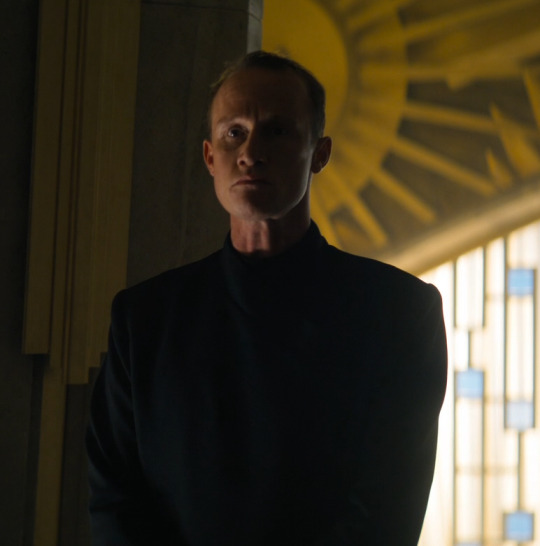
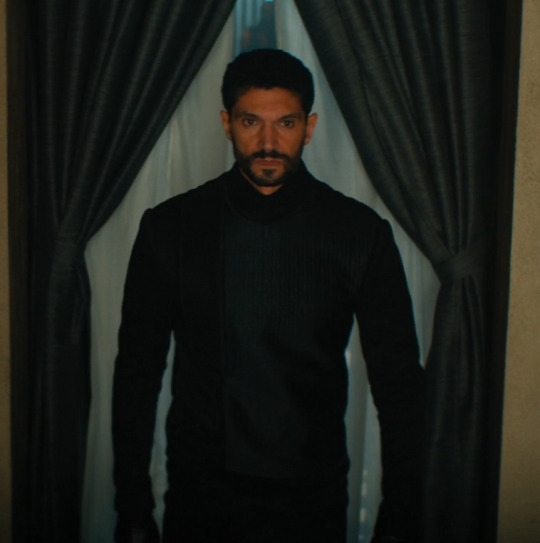
noticed earlier that greeve's shadowmaster uniform in 2.01 is way more basic than obrecht's was in the first season, with much less complexity in its texture, fabric, and cut - though greeve's does have some elegant-looking folds just beneath the collar (that are only really noticeable when he's shot lol. they catch the light very nicely for a moment)
obvious doylist explanation is that a production as notoriously cash-strapped as foundation is not going to commission a detailed costume for a character who gets less than a minute of screen time. but I do enjoy the watsonian logic of XVII demanding that all servant uniforms be made 75% less cunty and the cleons' outfits 200% more so. anything to prop up imperial pride
#source of it being XVII: XVI was still wearing the S1 style cleon clothes in his day flashback#also. it's XVII. XVI's just trying to get through the day#all jokes aside I do hope the budget doesn't affect costuming going forward :< S1 is really breathtaking on a rewatch#foundation#foundation season 2#foundation meta#txt
24 notes
·
View notes
Text
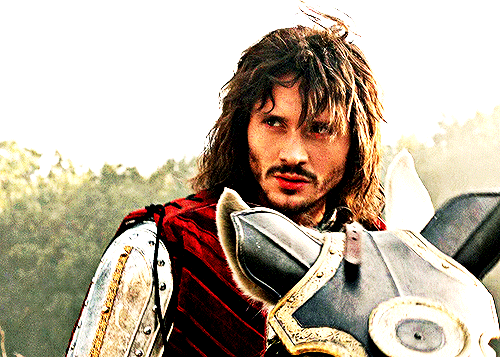

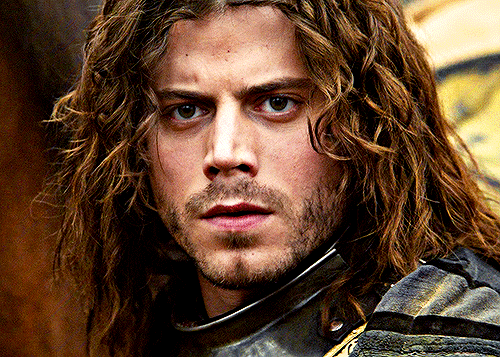

what i find so interesting is that after juan's death, it wasn't just cesare's physical features that began to echo his brother's appearance more strikingly than they ever had during juan's lifetime, but certain aspects of juan's personality also began to manifest in cesare as well! after rodrigo shared his long-planned dream of creating a papal bloodline to be passed down to cesare, cesare's perspective shifted, and he became increasingly preoccupied with the perceptions of others, leading him to adopt a more classist mindset. he even felt ashamed of his own mother when she offered him counsel and the opportunity to join him in battle, rejecting her due to her former occupation as a 'whore.' this is just one of the chilling examples of how juan's aftermath continued to impact cesare long after his death throughout the show.
#ok but except that cesare had soft divine curls while juan has messy wet curls lmaoo#doomed brothers who could've been close if their father didn't pit them against each other save me...save me doomed brothers...#that being said#he haunted the narrative ‼️‼️‼️#juan is such a banger character and a great example of an impactful dead character in media 🙏#the theme itself goes too hard as well like...foundational fratricide that led him to become the perfect prince™? 10/10 groundbreaking ✨️#cesare borgia#juan borgia#rodrigo borgia#the borgias#the borgias meta#david oakes#francois arnaud#françois arnaud#juan and cesare#text post#perioddramaedit
202 notes
·
View notes
Text
One of the things I'm liking about Scavenger's Reign and that it does pretty well is the 'in media res' start. A lot of shows (LOOKING AT YOU, FOUNDATION) try to make the audience care for the characters without taking time to establish them and throw them into the Big Situation. Scavenger's Reign starts slow and lets the audience experience the planet (and its weirdness) and how the characters interact with it: Ursula is inquisitive, Sam is pragmatic, Azi is wary, Kamen is fearful, Levi is accepting. This is established through Little Situations/ side quests before joining the main. They aren't being thrown into the Big Adventure without showing us little bits of who they are and how they've survived this long.
#scavenger's reign#scavengers reign#meta#storytelling#Yeah sorry I didn't give a flip about most of the characters in Foundation until mostways through season 1#And part of it was the poor character establishment through the in media res start.#WHY SHOULD I CARE SHOW?
569 notes
·
View notes
Text
I've remarked on this blog a few times before that I'm fond of the theory that The Shapeless One is Paracelsus, but I've always hesitated to elaborate, as I felt like there wasn't enough hard evidence that supported this theory being true. However, something recently clicked for me regarding one big parallel between them, and now I can't stop thinking about what that connection would mean for the story thematically.
In mémoire 61, after Machina pushes him to explain what his "plot" is, Teacher declares that he wants to achieve world peace. I've had no idea what to make of this line for a while now, just assuming that we'd need more context to understand what the actual hell he's talking about. But with the Paracelsus comparison, I feel like I'm starting to grasp what's going on there.
[This post needs a VnC-standard warning for mentions of suicide, sexual assault, and child abuse].
There are a few pieces of evidence that support the idea of Teacher being Paracelsus. VnC's Paracelsus is introduced as a great alchemist, just as he was in the real world, and the Count of Saint Germain was an alchemist as well. Nobody knows Teacher's origins, but he's one of the oldest vampires and close with the queen. There's also a little drawing of six-pointed stars that appears behind Paracelsus in the first storybook illustration of him, and those same stars are seen hanging from Teacher's walking stick in the scene where he first meets Noé.
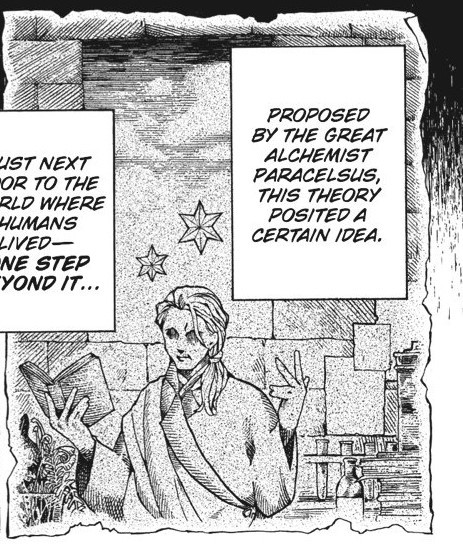
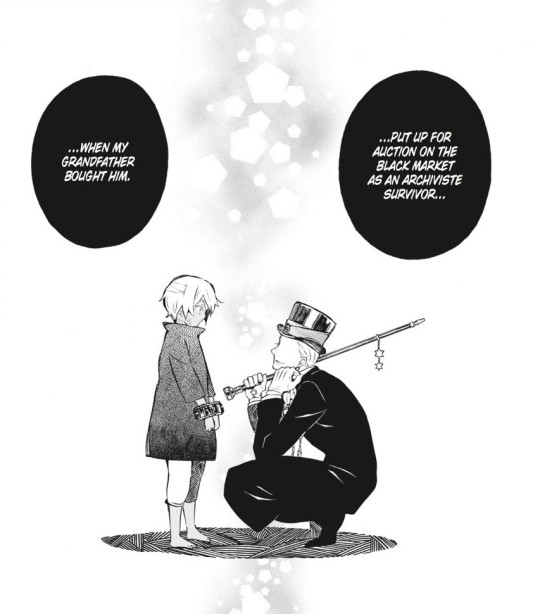
That panel of Teacher and Noé appears at the very end of chapter 6, and the Paracelsus panel appears at the start of chapter 7, meaning these images are quite conspicuously close together.
So what does this mean for Teacher's idea of "world peace"?
In the storybook version of Paracelsus's life, he's described as wanting to alter the world formula not for scientific curiosity, but because he wants to save the world.
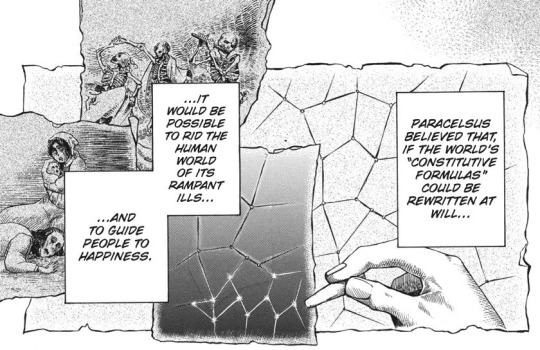
Paracelsus, per the childish version that Teacher presents to Noé, caused the Babel Incident because he was trying to "rid the world of its ills" and "guide people to happiness." The line about the human world's "rampant ills" is read over a drawing of dancing skeletons—a Danse Macabre. This is a Medieval way of drawing the personification of death, usually for the purpose of expressing the way that death comes comes for every person inevitably (the same theme later expressed by Vanitas art).
When Paracelsus speaks of the world's ills, this is the reality he seeks to cure. The world is afflicted with suffering and death, and he wants to rewrite the world's formula so that humanity can live happily without that pain.
A world rewritten to be without suffering—isn't that world peace? "World peace" is often used to evoke an end to armed conflict specifically, rather than suffering at large, but the concepts must overlap if they're pursued seriously. How can world peace last if there are people starving in famines or dying of disease? Suffering breeds violence. And how can someone seeking to alleviate "the world's ills" not want to achieve world peace?
If this is true, if Teacher's hope for "world peace" is him carrying on Paracelsus's legacy (or carrying on his own work, if they're the same man), then what does that mean for Paracelsus's supposed altruistic intentions?
We know little about Paracelsus now, only Teacher's recounting of the Babel Incident by way of a book he's reading to a child, but I think there are two ways to interpret what we do know.
Trying to rid the world of suffering is, on its face, the most noble possible intention. To lead the world to happiness is to attempt to help every other person in the world. And I can think of a lot of ways that Paracelsus's goals make absolute sense to me. If you discover that the fabric of reality can be rewritten, and you know that there are people in the world dying of famines, wouldn't you want to reshape the world so that they no longer have to go hungry?
It's possible, depending on what we find out about him in the future, that Paracelsus really will be a noble figure whose one great sin was hubris, and all he wanted from his research was to help the world in ways that make both moral and logical sense.
However, given some of VnC's other themes, I think there's another lens through which we should consider Paracelsus's actions. We don't know exactly what he was trying to rewrite with that disastrous experiment, but that Danse Macabre does give us one possible clue.
One of the themes that VnC has been slowly developing throughout its run is the idea that, though trying to save a person's life is noble, it is not noble to deny all death as a whole. This is a story about the concept of Vanitas, the idea that death is inevitable and that all else is rendered meaningless in its face. Noé feels like he failed Louis because he was unable to kill him when he asked, and it seems like the manga's being set up to end with Noé killing Vanitas to escape a fate Vanitas considers worse than death. One big part of what makes Mikhail so unsettling is his denial, his laughing about his mother's draining and the fact that he cannot accept the reality Luna has died, and Vanitas is horrified to hear that Misha is planning to resurrect their parent. That same issue goes on to be the one thing that finally drives a wedge between Noé and his teacher, as Noé can apparently forgive the man for purchasing him on the black market and killing Louis, but he's horrified to hear that Teacher told Mikhail that resurrecting Luna was possible.
All of these scenes have other elements to them, other things that drive the characters and inform why these specific ideas of undeath are so deeply horrifying to them, but the buildup of this running theme is an undercurrent through all of it. Vanitas means that someday all people must die, so what does it mean when somebody tries to deny that?
Even further, there's the broader horror of both Noé and Mikhail failing to process the bad things that happen to them. Misha commits blithe horrors in part because he does not understand that his sexual abuse was wrong, so he seems to see no problem with sexually assaulting others now in turn—as he does when he pressures Noé to drink his blood. Noé happily recounts being kidnapped and sold on the black market, remarks on Chloé and Jean-Jacques's goodness minutes after Chloé assaults him in his sleep, and brushes off the incident of Jean-Jacques drugging him to the extent that even Jean-Jacques himself is unnerved by it. All of that is deeply concerning behavior.
Misha is written to be obviously uncanny in his denial, and that uncanniness holds up a mirror to the subtler horror of Noé's own disconnects from reality. The more recent chapters have also begun drawing direct attention to the ways that Noé's denial of the bad in the world becomes problematic. The aforementioned scene of Vani, Dante, and JJ being disturbed by Noé's "it doesn't bother me" line does this, as does the long discussion Noé and Vanitas have about why Noé's ignorance of anti-Dham racism upsets Dante so much.
There is an ongoing tension in VnC between the inherent goodness of peace and life and the horror of what comes when those concepts are taken too far. Noé and Vanitas are this in a nutshell: an endlessly clashing duo made up of a too-extreme pessimist and a too-extreme optimist. The story arcs thus far have taken turns challenging each of their worldviews, slowly pushing Vanitas to open up and let himself hope for peaceful solutions, let himself accept love and emotional closeness, while also slowly pushing Noé to confront the fact that sometimes not everything has a happy-making peaceful solution after all. Sometimes "saving" a child means she has to die, and sometimes an enemy will have an entirely sympathetic reason to hate vampires, but Noé still has to fight them anyway to save the people he wants to save, regardless of whether that enemy is "right" or not.
Noé lives in denial of his own past traumas and his own present-day potential for harm. He denies the potential that "good" people he meets might harm him, and he struggles to accept instances where he has harmed others in turn. Dominique and Vanitas go on for pages after the amusement park about how reckless and overly trusting he can be, and he turns around, unable to cope, when confronted with the truth of what he did to Misha with his claws. However, Noé also has the benefit of his proximity to Vanitas knocking just a bit of sense into him, and it might not be a sure thing that he's going to stay in denial-land forever.
One of VnC's specific points of tension is the question of if/how Noé will grow to accept the hard things that currently bounce off his oblivious denial like water off of a raincoat. The end of mémoire 1, the statement that someday he's going to kill Vanitas, suggests that perhaps he might learn to understand how death, despite its pain, is important in its own right. It suggests that maybe he'll come around to no longer denying death and insisting that salvation is always its avoidance.
However, if he can't quite make that leap, the story provides us with dark mirrors to show us what a monster Noé could become by doubling down on his idealistic, optimistic denial. Misha's current state is Noé to an extreme, an innocent child committing horrors as he utterly fails to process the truth of his own horrific early childhood. Misha's driving motivation is a hatred of pain and suffering, and he's willing to do anything to resurrect the family that saved him from that pain in the past.
Then there's also Lord Ruthven, a man who was once an optimist in Noé's own mold, but has since broken bad in a spectacular way. Noé and Ruthven recite the exact same line about liking both humans and vampires, an obvious parallel, but now Ruthven is working with Naenia. Now he's living in the aftermath of his idealistic peace plan imploding and almost costing him his life. Ruthven despairs the last time he visits Gévaudan, lamenting the wrongness of his naive past hopes for understanding, and now he's working toward some unknown end involving Naenia, Charlatan, and the Queen. Now he's committing horrors of his own, biting at least three people by force, overriding their wills, and associating with the being that steals innocent people's true names.
There's also the question of what the hell Ruthven is doing with the queen. It seems he was somehow involved with Faustina devolving to her current state, and Loki references "smashing up her corpse," so it's possible Naenia's existence may be a sign that Ruthven wants or wanted her dead and/or cursed. However, the shots of him with the Faustina-like body in the tank at the end of mémoire 18 suggest there's a chance that he could instead be involved with some form of resurrection scheme (or a scheme to preserve/save her if she's not yet fully dead).
Ruthven exists in part to demonstrate the ways that an idealist like Noé can go bad, and it's possible that he, like Misha, is attempting some sort of awful resurrection, once again denying the reality of death.
Then, finally, there's one more character with whom Noé has these sorts of obvious parallels. The man who, perhaps, is also meant to represent what Noé could become if the dangerous sides of his optimism aren't reigned in: his teacher.
Noé is fascinated by Vanitas, drawn to him out of care and connection, but also because he wants to observe and understand him to sate his curiosity. In a darker mirror of the same trend, we see Noé's teacher allow Louis, Noé, Domi, and Misha to come to harm at least in part for the simple enjoyment of seeing how they react when placed in dark new situations. Noé and his teacher are also the only crimson vampires we know of who find the Blue Moon beautiful and alluring, rather than a source of fear (assuming that Teacher is a normal crimson vampire).
Noé was raised by this man; his worldview has been shaped by him in countless ways big and small. Noé was already living in cheerful rejection of trauma before The Shapeless One found him, but he could not have remained so radically detached from the painful parts of the world around him if his teacher had not wanted and allowed him to do so. He censored Lord Ruthven out of Noé's education, and he apparently did the same with anything that discussed (or expressed) severe bigotry toward Dhampirs. How else did Teacher shape him, and to what goal?
We know that the Shapeless One taught Noé how to fight. Given that "world peace" line, I wonder if perhaps he may also have taught him his morals on wanting to avoid conflict.
Teacher is a contradiction. He talks about "world peace," but he blithely leads Louis to his doom and supposedly doesn't hesitate to half-kill anyone who calls him by the wrong name. Marquis Machina calls him an incomprehensible natural disaster for this reason. Yet, despite all his rampant cruelty, I'm beginning to think that he might be just as much of a dangerous optimist as his student.
Teacher is defined by the fact that, in every scene, he always seems to look like he's having fun. There's hardly been a single panel where he's not drawn smiling. Sometimes that fun is vicious, a cruel smile made as a threat to Vanitas when he fails to address him by his name, but just as often, his aura seems horrifically innocent. He's just a man with a sweet smile and rather dull eyes having a very good time with life.
In the past I've largely looked at this smile as an extension of Teacher's sadism. He toys with Louis and Noé for the fun of it, and I took his smile as an expression of his cruel enjoyment of the pain he creates in his wake. However, now that we've seen him interact with Machina, now that we've observed him speaking casually with a peer for an extended period, there seems to be a disturbingly sincere quality to him as well.

Based on how he's portrayed in mémoire 61, when Teacher says he does everything he does for the sake of "world peace," I honestly think I believe him. I don't believe that he's not a villain—I can't guarantee that his vision of "world peace" would even align with a normal person's definition of "peace" or "happiness," but I believe that he's speaking some version of honestly here.
There's an honest to goodness optimism in that ever-present smile. There's a hope and a genuine quality to what he announces to Machina, in contrast to his smiles of sweetly cruel schadenfreude.
So perhaps, if all that is true, if Teacher is another dark mirror to Noé and he really does want to bring about world peace, then the point of him is that "world peace" has the potential to be a horror. What is the pursuit of world peace if not the ultimate pipe dream of every idealist in the mold of Noé and Ruthven? And what is VnC if not a long catalog of the horrors that idealists can bring about if they aren't careful?
And that, finally, brings me back to Paracelsus and the Danse Macabre.
Depending on what Paracelsus wanted to achieve through his experiments, it's possible he may have been yet another character trying to escape the harsh reality of death. The line about the world's "rampant ills" is placed over the Danse Macabre, after all—a symbol of death's universal inevitability. Is that the painful ill that Paracelsus wanted to address by rewriting the world formula? Inescapable death itself?
If so, Paracelsus becomes the ultimate embodiment of what happens when one denies death's certainty and the necessity of that certainty. He's the ultimate denial of "Vanitas" and what it represents on a scale far larger than Noé, Misha, or even Ruthven could grasp. And the manga casts his failed experiment as a Tower of Babel, throwing the world into chaos and causing countless deaths in his failure's wake.
Meanwhile, Teacher seems to have some ideas about how to cheat death in the present day, as he's promised Misha that there's a way to bring "The Vampire of the Blue Moon" back to life. This could be a lie, of course, or he could be planning to bring back "the vampire of the blue moon" in a way that does not actually bring back Luna as an individual. However, even trying to bring back the Blue Moon in some other way, perhaps through the human Vanitas, still represents him trying to restore something he found beautiful that was lost because of death. It still ties him thematically to the perversion of death as an ending, the same as Mikhail and Ruthven.
So far every character we've seen that wants to undo death is cast as an antagonist. Ruthven, Mikhail, and The Shapeless One are all united by a cruelty and a perverseness in various forms, and their goal is part of this. Death is a tragedy, but although trying to save the lives of people who want to live is noble, attempting to undo or eternally escape death is a far worse horror.
If Teacher is Paracelsus, or if they're closely connected in some other way, then that serves to further this point and show how the horror of escaping death extends to Paracelsus as it does the others. Teacher is strange and cruel. Paracelsus might be a nobly hubristic historical fool in a storybook, but if these two characters are connected, that instantly reveals the unsettling truth of how wrong Paracelsus's potential attempt to thwart death would have been. Nothing Teacher is working for can be wholly good.
And, just as Noé and Misha's denial is both present and harmful beyond the most severe subject of death, even if Paracelsus wasn't trying to craft a world without death by altering the world formula, we know he was trying to create a world without suffering. Again, this is a noble goal in theory, but so long as death remains, some suffering will remain as well. Crafting a world without pain and suffering can also go much too far, can slip into denial and cruelty. Mikhail's whole motivation as an antagonist is his search for a life without pain, and look where that's led him.
A rejection of all suffering can be an extremely dangerous thing, whether it's running from one's own mental pain or wanting to rewrite the world to negate all suffering as a whole. This dream will never not be a detachment from reality.
The Case Study of Vanitas is a series that seems to be searching for a balance of optimism and pessimism, a way to approach the harsh realities of life that lies between the toxic extremes embodied by Vanitas and Noé. To lapse too far into hopeless pessimism creates a Vanitas, a Chloé, an Astolfo. It creates people who are suicidal, genocidal, or both, and dangerous to themselves and others for it. However, to go through life in a state of eternal joy without processing one's pain, or to attempt to create a world wholly free of suffering—that is just as dangerous and foolish. What are Noé, Misha, and Ruthven if not dangers to themselves and others? What is Teacher if not the most dangerous man in this manga?
Noé and Misha are unsettling because they smile through the bad things that happen to them and act as though they aren't bad. They each have some exceptions to this rule—Louis's death for Noé and the pain suffered at the hands of Moreau for Misha—but they still come across as at times disconnected from the reality of pain.
Yet, neither of them is as disconnected from the reality of pain as a man that can behead the grandson he raised with a smile on his face. Noé as a child sees the fun in being kidnapped and put up for auction. Teacher, if his smile is to be believed, sees the fun in every single thing we've seen him do, and that's what's so unsettling about him. He genuinely seems to be having a good time, including and especially when he's blithely committing horrors for the fun of it.
Noé and Misha's strange behavior stems from trauma, and we don't know that's the case for Teacher. Perhaps not, as he seems much colder and crueler in his tendencies than either of them. But either way, the happy sincerity displayed by both of them is echoed in the face of the Count of Saint Germain as he tells Machina that he's searching for world peace. That is the face of someone idealistic, someone who believes he's working toward a real goal that both justifies and delights him.
Teacher wants world peace, and his warped nature means that we have no real idea what "world peace" means to him. Is a world at peace a world where he still gets to violently beat people who get his name wrong? A world where he still gets to have fun observing the free will and choices of the traumatized children he raises? Maybe he once believed in a world that was truly without suffering, and his overly-long life and mad optimism have eroded his tether to reality, turning him into the awful person we see now. Maybe the catastrophe of the Babel incident broke him and turned him from a hubristic idealist to warped echo of his former self. Maybe he somehow thinks all the suffering he causes is justified if it's in pursuit of his noble end goal. Maybe his version of "world peace" is a world where all people can live free from the fear of death, and the smaller pains caused along the way are irrelevant in the face of that impossible dream.
Or maybe he's just a cruel hypocrite.
In the end, we still know too little about both Paracelsus and Teacher to make any grand proclamations about the truth of their characters. However, I can't unsee this connection between them now that I've seen it. Teacher is one of Noé's dark mirrors, a character that represents the horrors possible when one goes too far down his current emotional path. Noé is optimistic to a fault, convincing himself to see only the best in many truly awful scenarios, and Teacher is the man with an eternal smile printed on his face. Noé loves and wants to save Vanitas, and Teacher speaks of the Blue Moon's ultimate beauty and says he has a way to bring them back to life now that they're dead. Noé is the eternal savior, always desperate to prevent people from dying, and Teacher claims that everything he does is done in the name of achieving world peace.
Similarly, Paracelsus is defined by throwing the world into chaos and horror due to his over-optimism. He tried to go too far, tried to rid humanity of its countless ills and create his own form of world peace, perhaps even tried to rewrite the reality of death. Did he hate pain and cold like Misha? Did he want to stop unjust wars like Ruthven? Did he want to become a savior in the image of Noah?
If Teacher's goal of "world peace" is to be believed, then whether or not Teacher and Paracelsus are actually the same person, they represent the same thematic extreme. Death is inevitable, says the concept of Vanitas. It's inevitable and Noé must learn to accept that fact before he does something awful in the name of pain and death's prevention. Teacher and Paracelsus have both done something(s) awful in the name of pain and death's prevention. Teacher and Paracelsus have followed Noé's path of optimism to such an extent that they, in one way or another, both claim(ed) to want to save the world, and this requires a mad extreme of Noé-like cognitive dissonance and hubris.
Paracelsus pursued some goal, some way of granting humanity happiness that was supposedly noble but still murky in its specifics, and he warped the fabric of reality and caused the countless disasters of the Babel Incident in the process. And that's assuming the storybook is true, and Babel really was accidental on his part. Meanwhile Teacher has warped the seemingly noble dream of world peace into something that he can claim is served by the way he's tormented Louis, Misha, and Noé. There's a chance that both men tried or are trying to undo the reality of death. They're bound by the same underlying current of scientific curiosity intermingled with their dreams of world peace.
Noé is not an alchemist, and he's not particularly skilled at rewriting the world formula. He's unlikely to have any chance to rewrite the fabric of reality itself for the better. He's unlikely to have any chance to achieve "world peace" by any definition.
Noé is, however, a dangerous optimist who has not yet learned that death is unavoidable. He hasn't yet learned that death can be preferred to its alternatives. And he was raised by a man who seems like he has not learned or does not care that disrupting Death in the grand sense will inevitably lead to horror. Or perhaps a man who enjoys horrors and wants to toy with absolute death as a part of that. And all this in a world warped and defined by the folly of a man who may also not have understood the horror of evading death.
So Teacher might be Paracelsus. I think this connection between them only strengthens the odds of that theory being true. But even if he isn't, they represent a similar thing for Noé and for the manga's themes at large. You cannot rid the world of the Danse Macabre, and attempting to end that dance will only bring greater ills and greater pain than death on its own could ever hope to bring.
A strange and dangerous man proclaiming with an honest smile that he wants to bring about world peace does not make him any less strange or dangerous. Depending on his definition of world peace and his idea of death's place in it, that idealistic goal may actually make him far more dangerous than if he were nothing more than a simple sadist.
#I've talked at length about some of these ideas in other posts before#but putting this together felt like finally being able to marry a few different major themes I've written about#that have stayed largely disparate up to this point#also huge shoutout to the several other theorists I've seen point out the thing with teacher and paracelsus and the stars#that's such a cool detail#ANYWAY this is more of a reach than what I'd usually stake a whole meta essay on. but I feel like my thematic foundations are sound#vnc#vanitas no carte#the case study of vanitas#teacher#vnc teacher#the shapeless one#comte de saint germain#vnc paracelsus#teacher my beloathed#noé archiviste#theory#english major hours#vnc spoilers
115 notes
·
View notes
Text
My increasingly preferred interpretation of the SCP Foundation is the version invoked by SCP-173- the fluorescent-lit bureaucracy housing or monitoring a few hundred distinctly impossible objects, entities or locations; contained and corralled less out of some sweeping ideological mandate about the veil of secrecy and more for the practical reason that they have no goddamn idea what these things can do or how they'll react to any given stimuli. Largely (though not totally) divorced from extant folklore and conspiracy culture in favor of a unique pantheon of weirdos that don't fit an obvious schema. Terse, clinical documentation that nonetheless clearly implies a discovery process only a little to the left of a bunch of nervous nerds poking at something with a long stick to see what happens. Don't get me wrong, I love the modern foundation. I love Eigenweapons, I love Akiva Radiation and tactical theology, I love the sprawling supernatural subcultures and the nine different equally-extant eschatologies that are slugging it out. But after a certain number of articles predicated on entire secret fields of academia or postmodern articles about "what even is an anomaly, man," you become increasingly aware of the ways in which you're looking at least three really cool settings that don't necessarily play nice with each other thematically. There Is No Canon yadda yadda
#a lot of the newer articles are predicated on the foundation having a pretty strong theoretical schema for the stuff they're containing#that's explained! That's an explained SCP!#and of course you can easily square this with the idea that the foundation is more about shoring up it's own power#but that's a different vibe from the earlier stuff#thoughts#meta
127 notes
·
View notes
Text
Now I love our sex plants as much as anyone else but going off PIDW meta lore given its a male oriented fantasy the whole nature of there being a plant that sex pollens every few feet is funny but not accurate. As someone who's read/watched way too much hentai aphrodisiacs tend to come as drug forms or are a poison from a monster. More likely are you to come across something that dissolves clothing, or traps you in a compromising position, or simply creates opportunities and excuses for fetishes. Sex pollen as a trope is more a fanfic and female driven project element.
So let me propose while a few variants of papapa flowers existed before they were more relegated to scary tentacle plants and the like. But because the genre has shifted from stallion novel to danmei suddenly there's a riging surge in a new species of fuck flower and Qian Cao Peak is floored. Sure there were plants that could be turned into fuck or death aphrodisiacs but not sex pollen outbreaks. How are you supposed to prep for that? What does allergy season become!! And how does Peak Lord Shen keep finding a new species every other week? What's the biology in the plant world here???!!!
#svsss#scumbag system#svsss shitpost#scum villain self saving system#pidw meta#scum villain#the profound cosmic horror that the very foundation of the world shifts to align with the relationship status of a hot mess couple
71 notes
·
View notes